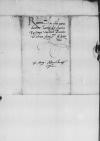List #2312
Samuel MACIEJOWSKI do Ioannes DANTISCUSJedlnia, 1540-05-03
| odebrano Marienburg (Malbork), 1540-05-10 Rękopiśmienne podstawy źródłowe:
| ||||
Tekst + aparat krytyczny + komentarzZwykły tekstTekst + komentarzTekst + aparat krytyczny
Reverendissimo in Christo Patri, domino
Reverendissime in Christo Pater, domine et amice carissime et honorande.
Habet istic causam quandam generosus dominus
Opto Reverendissimam Dominationem Vestram bene valere, cui me commendo.
Ex
Eiusdem Dominationis Vestrae Reverendissimae servitor

